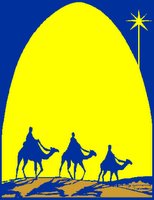
Part Seven: We Three Kings...
First question - were they kings? This is one of those translational issues where they are never in the Bible referred to as Kings. The song that we're all familiar with was penned in 1857 by John Henry Hopkins, Jr. but "Kings" in the modern sense of the word is not entirely accurate. Rather they were "magi" - a translation of the Greek "magos". They were astrologers/astronomers and were rulers of some sort but perhaps not kings in the sense we interpret the word today. This is clarified in a quote from the Wikipedia article:
"The three pagan kings were called Magi not because they were magicians but because of the great science of astrology which was theirs. Those whom the Hebrews called scribes and the Greeks, philosophers, and the Latins, wise men, the Persians called Magi. And the reason that they were called kings is that in those days it was the custom for the philosophers and wise men to be rulers."So we'll let the Kings term slide but what about this notion of "Three"? The number of wise men is never stated in the Bible. (I'll wait while you check....) See?!?? Aren't you surprised? All this time you thought the carol was Biblically inspired and nowhere does it say there were three of them! The number is assumed because there were three gifts presented, but maybe there were five of them and they needed three to haul around the gold? Or maybe it was twelve but only three brought gifts? "But wait," you argue, "there must be three of them! We learned their names in Sunday school: Caspar, Melchior, and Balthasar!" Clue phone - it's for you. These names aren't listed anywhere in the Bible. I would assume they came from some oral tradition, poetry or artwork as the names given vary all around the world (and Caspar, Melchior, and Balthasar aren't even Persian names). In Ethiopia it's Hor, Basanater, and Karsudan; in Syria they are Larvandad, Hormisdas, and Gusnashaph.
- Ludolph of Saxony
And another thing, they didn't show up at the stable. Sorry folks, I know it's another strike against the nativity scene and the Christmas play but they were sent out from Herod when Jesus was born and Matthew 2:11 says that "They entered the house where the child and his mother, Mary, were, and they fell down before him and worshiped him." This was after the manger part. But don't worry, the shepherds were there for that part so you don't have to eliminate the bathrobe boys from the pageant.
So now you're guessing that next I'll tell you they didn't even bring him the gifts, right? Well, no. The gift part as you know it is correct - and thank God it is cause that's where the tradition of Christmas presents comes from - Woohoo!! But just for the sake of looking deeper here too, we all know it was gold, frankincense and myrrh, but why? Each gift represents a different aspect of Christ's purpose on Earth and in the full song We Three Kings, each gift has a verse. Gold represents his kingship and giving of gold is a direct sign of worship.
Born a King on Bethlehem's plain, gold I bring to crown him again,
King forever, ceasing never,over us all to reign. Frankincense to offer have I; incense owns a Deity nigh;
prayer and praising, voices raising, worshiping God on high.
Myrrh is perhaps the mostt striking though in that it is a spice used in preparing bodies for burial - an odd thing to present to a child unless to represent that his death would be the ultimate gift, an atoning sacrifice for the world. prayer and praising, voices raising, worshiping God on high.
Myrrh is mine; its bitter perfume breathes a life of gathering gloom;
sorrowing, sighing, bleeding, dying, sealed in the stone-cold tomb.
Hope this was informative and interesting to all of you. As one more side note, despite it's inaccuracies, I still love the song We Three Kings. I love the final verse that sings "Glorious now behold Him arise, King and God and Sacrifice" but perhaps my favorite lyric is in the chorus after "westward leading" the two simple words that are packed with meaning "Still Proceeding". Even today wise men still seek Him.

No comments:
Post a Comment